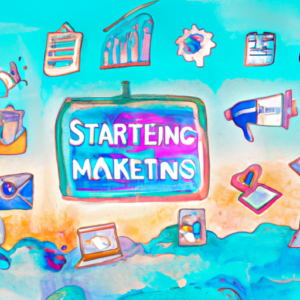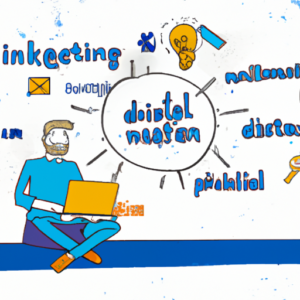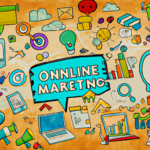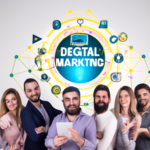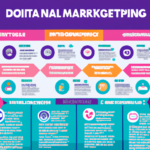In today’s increasingly digital world, marketing online has become an essential tool for businesses to thrive and succeed. As consumers spend more time online, it is crucial for brands to tap into the power of digital advertising and unleash its potential. This article aims to explore the various aspects of marketing online, from understanding its power to implementing effective strategies and navigating the ever-changing digital landscape. By delving into the key trends and tools for successful online marketing, businesses can maximize their reach and engagement, ultimately driving growth and success in the competitive online marketplace. So, let’s dive in and discover the endless possibilities that marketing online has to offer.
- 1. "The Power of Marketing Online: Unleashing the Potential of Digital Advertising"
- 2. "Effective Strategies for Marketing Online: Maximizing Reach and Engagement"
- 3. "Navigating the Digital Landscape: Key Trends and Tools for Successful Online Marketing"
1. "The Power of Marketing Online: Unleashing the Potential of Digital Advertising"

In today’s digital age, the power of marketing online has become undeniable. With the ever-increasing number of internet users and the shift towards digital platforms, businesses have recognized the immense potential of digital advertising. Marketing online offers a plethora of opportunities for businesses to reach their target audience, build brand awareness, and drive sales.
One of the key advantages of marketing online is its ability to reach a global audience. Unlike traditional marketing methods, such as print ads or TV commercials, digital advertising allows businesses to transcend geographical boundaries and connect with potential customers from around the world. This opens up a world of possibilities for businesses to expand their reach and tap into new markets, ultimately leading to increased brand visibility and growth.
Another significant aspect of marketing online is its cost-effectiveness. Traditional advertising methods can be quite expensive, especially for small businesses with limited budgets. On the other hand, digital advertising offers various cost-effective options, such as social media marketing, search engine optimization (SEO), and pay-per-click (PPC) advertising. These channels allow businesses to target specific demographics, interests, and behaviors, ensuring that their marketing efforts are reaching the right audience at the right time. This targeted approach not only saves costs but also maximizes the return on investment (ROI).
Furthermore, marketing online provides businesses with valuable data and insights. Through various analytics tools, businesses can track and measure the performance of their online marketing campaigns in real-time. They can gather information about website traffic, user engagement, conversion rates, and more. This data allows businesses to make data-driven decisions, optimize their marketing strategies, and continuously improve their online presence.
Moreover, marketing online enables businesses to engage with their audience on a more personal and interactive level. Through social media platforms, businesses can create a dialogue with their customers, respond to inquiries, address concerns, and build a loyal community. This level of engagement fosters trust and credibility, ultimately leading to customer loyalty and repeat business.
In conclusion, the power of marketing online cannot be underestimated. It offers businesses the opportunity to reach a global audience, cost-effectively target their marketing efforts, gather valuable data, and engage with customers on a personal level. By harnessing the potential of digital advertising, businesses can propel their brand forward, drive sales, and stay ahead of the competition in the ever-evolving digital landscape. So, don’t miss out on the immense benefits of marketing online and embrace the digital revolution to soar to new heights of success.
2. "Effective Strategies for Marketing Online: Maximizing Reach and Engagement"

In today’s digital age, marketing online has become an essential component of any business strategy. With the widespread use of the internet and social media platforms, reaching and engaging with potential customers has never been easier. However, with so much competition online, it is crucial to implement effective strategies that maximize reach and engagement. Here are some key tactics to consider:
1. Search Engine Optimization (SEO): One of the most important aspects of marketing online is ensuring your website and content are optimized for search engines. By incorporating relevant keywords, meta tags, and high-quality content, you can improve your website’s visibility in search engine results pages (SERPs). This will greatly enhance your chances of reaching your target audience and driving organic traffic to your site.
2. Content Marketing: Creating valuable and engaging content is key to attracting and retaining online customers. By developing informative blog posts, articles, videos, or infographics, you can establish your brand as an authority in your industry. Sharing this content on social media platforms and optimizing it for SEO will further increase its reach and visibility, driving more traffic to your website.
3. Social Media Marketing: Social media platforms provide businesses with an excellent opportunity to connect and engage with their target audience. By creating compelling and shareable content, actively participating in conversations, and utilizing targeted advertising, you can effectively promote your products or services. Social media marketing also allows for direct customer interaction and feedback, helping to build brand loyalty and trust.
4. Email Marketing: Despite the rise of social media, email marketing remains a powerful tool for reaching and engaging with your audience. By building an email list and sending regular newsletters or promotional offers, you can nurture leads and encourage repeat business. Personalizing your emails and segmenting your audience based on their interests and preferences will significantly improve engagement and conversion rates.
5. Influencer Marketing: Collaborating with influential individuals or bloggers in your industry can greatly expand your online reach. By leveraging their established audience and credibility, you can tap into a new customer base and gain valuable exposure. When selecting influencers, ensure that their values align with your brand and that their followers are part of your target market.
6. Analytics and Data Tracking: To continually improve your online marketing efforts, it is crucial to track and analyze data. Utilize tools like Google Analytics to gain insights into visitor behavior, conversion rates, and other key metrics. This data will help you identify which strategies are working effectively and which need adjustment, allowing you to optimize your marketing campaigns for maximum reach and engagement.
In conclusion, marketing online requires a well-rounded approach that considers various strategies to maximize reach and engagement. By incorporating SEO techniques, focusing on content marketing, leveraging social media platforms, utilizing email marketing, collaborating with influencers, and analyzing data, businesses can effectively promote their products or services online and achieve their marketing goals.
3. "Navigating the Digital Landscape: Key Trends and Tools for Successful Online Marketing"
![]()
Navigating the Digital Landscape: Key Trends and Tools for Successful Online Marketing
In today’s fast-paced digital world, online marketing has become an essential component for businesses of all sizes. With the ever-evolving nature of the internet, it is crucial for marketers to stay up-to-date with the latest trends and leverage the right tools to effectively reach their target audience. Let’s explore some key trends and tools that can help businesses succeed in their online marketing efforts.
One of the most significant trends in online marketing is the increasing use of social media platforms. With billions of active users, platforms like Facebook, Instagram, Twitter, and LinkedIn offer an unparalleled opportunity to connect with potential customers. By creating engaging and shareable content, businesses can effectively promote their products or services, increase brand awareness, and drive traffic to their websites.
Search engine optimization (SEO) is another crucial aspect of successful online marketing. By optimizing their websites for search engines, businesses can improve their visibility in search results and attract organic traffic. This involves keyword research, on-page optimization, and link building, among other strategies. Implementing SEO best practices can significantly improve a website’s ranking, leading to increased visibility and more opportunities for customer acquisition.
Another trend that cannot be overlooked is the rise of mobile marketing. With the majority of internet users accessing the web through their smartphones, businesses must ensure that their websites and marketing campaigns are mobile-friendly. Responsive web design, mobile apps, and SMS marketing are some of the tools and techniques that can help businesses effectively engage their mobile audience and drive conversions.
Content marketing has also emerged as a powerful tool for online marketing. By creating valuable and relevant content, businesses can establish themselves as industry experts, build trust with their audience, and drive customer engagement. Content marketing encompasses various forms, including blog posts, videos, podcasts, infographics, and ebooks. When combined with SEO techniques, content marketing can help businesses attract and retain customers in a highly competitive digital landscape.
Email marketing remains a tried and tested tool for online marketing success. While social media and other platforms have gained popularity, email marketing continues to offer high conversion rates and a personalized approach. By building an email list and sending targeted campaigns, businesses can nurture leads, build customer loyalty, and drive repeat business.
To effectively navigate the digital landscape, businesses must also leverage analytics tools. These tools provide valuable insights into customer behavior, website traffic, and campaign performance. With access to data-driven metrics, businesses can make informed decisions, optimize their marketing efforts, and achieve better results.
In conclusion, marketing online requires businesses to stay on top of key trends and utilize the right tools. By embracing social media, optimizing for search engines, adopting mobile marketing strategies, leveraging content marketing, utilizing email campaigns, and leveraging analytics, businesses can position themselves for success in the digital landscape. By continuously adapting to the changing online landscape, businesses can effectively reach their target audience, drive conversions, and stay ahead of the competition.
In conclusion, marketing online has evolved into a powerful tool for businesses to unleash their potential and reach a wider audience. This article has explored the effectiveness of various strategies in maximizing reach and engagement, while also highlighting the key trends and tools that are essential for successful online marketing. By understanding the power of marketing online and utilizing the right strategies and tools, businesses can thrive in the digital landscape and achieve their marketing goals. Whether it’s through search engine optimization, social media marketing, or content creation, the possibilities for marketing online are endless. So, embrace the digital era and take advantage of the opportunities it presents for your business to grow and succeed. Start marketing online today and watch as your brand reaches new heights in the digital world.



